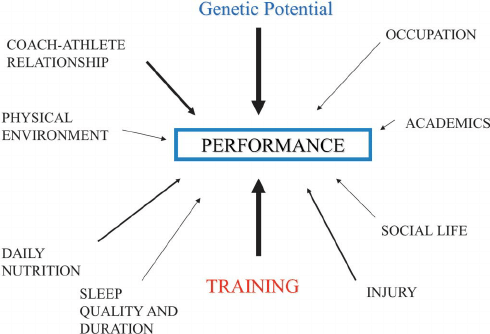Sport.
What actually is a sport? You actually may hear this word a lot but have you ever thought about its true definition?
To enjoy the glow of good health, you must exercise.
Gene Tunny, American professional boxer.
The first thing that comes to your mind at the thought of “sports” is probably matches, scoring goals, winning trophies, etc.
However, sports are actually more than that. It is the physical activity that improves mental well-being, physical fitness and social interaction.
What are the factors that affect athlete performance?
Playing sports at entry-levels or professional levels comes with many advantages for your health including improving cardiovascular health, lung function, increase self-confident, reduces stress and more.
However, your successfulness in sports, and what you could expect out of each activity, is dependent on many factors.
According to research published in the Strength and Conditioning Journal, the factors impact the performance of athletes are illustrated in the figure below:

Factors that affect athlete performance
(Bazyler, Abbott, Bellon, Taber & Stone, 2015)
Basically, your sports performance is influenced by many other factors outside of your training intensity. If you find yourself struggling with your sports performance, you should try to evaluate as many factors as possible to identify the cause.
Genetics and sports
The performance of an athletic person is influenced by both environmental and genetic factors.
However, it should be noted that a gene variation in your DNA can have either an enhancing or worsening role in an athlete’s performance. In fact, the study shows that genetic factors contribute to approximately 30% – 80% of the differences in performance traits among human beings.
10 genes associated with fitness performance
- ACTN3 Gene: A gene for speed.
- ACE Gene: Endurance and muscle power.
- PPARA gene: Fat-burning gene.
- ACVR1B: Strength gene.
- IL15RA Gene: Muscle volume.
- MSTN Gene: Unusual muscle size and strength.
- PGC1A gene: Aerobic capacity.
- UCP2 + UCP3 Genes: Energy metabolism.
- ESR1 and SHBG1 + SHBG2 genes: Testosterone-influencing genes.
- IL6 gene (require long-time recovery ): Inflammation and recovery gene.
ACTN3 gene & ACE gene – how do they influence your fitness level?
ACTN3 gene
This gene is mainly expressed in skeletal muscles and associated with athlete performance. Variation of this gene results in a significant strength baseline, which plays a protective role against muscle injury and increases the muscle fibre that is used during sprinting, also known as fast-twitch muscles.
The ACE gene for Endurance
A variation in this gene will result in having great endurance for long-distance events. In other words, it would enhance an athlete’s running performance in an ultra-endurance event.
By now, you may have gained a little more knowledge about how your genetics play a role in your fitness and health status. But did you know that you can get a personalized report that can give you more substantial information and guide on how to exercise effectively and efficiently based on your genes?
Discover your DNA and how it affects your fitness level with our DNA Explorer Essential today!
For more information about your genes, feel free to check out our website or chat with us on Facebook to exchange ideas.
Reference:
Bazyler, Caleb & Abbott, Heather & Bellon, Christopher & Taber, Christopher & Stone, Michael. (2015). Strength Training for Endurance Athletes: Theory to Practice. Strength and conditioning journal. 37. 1-12.
